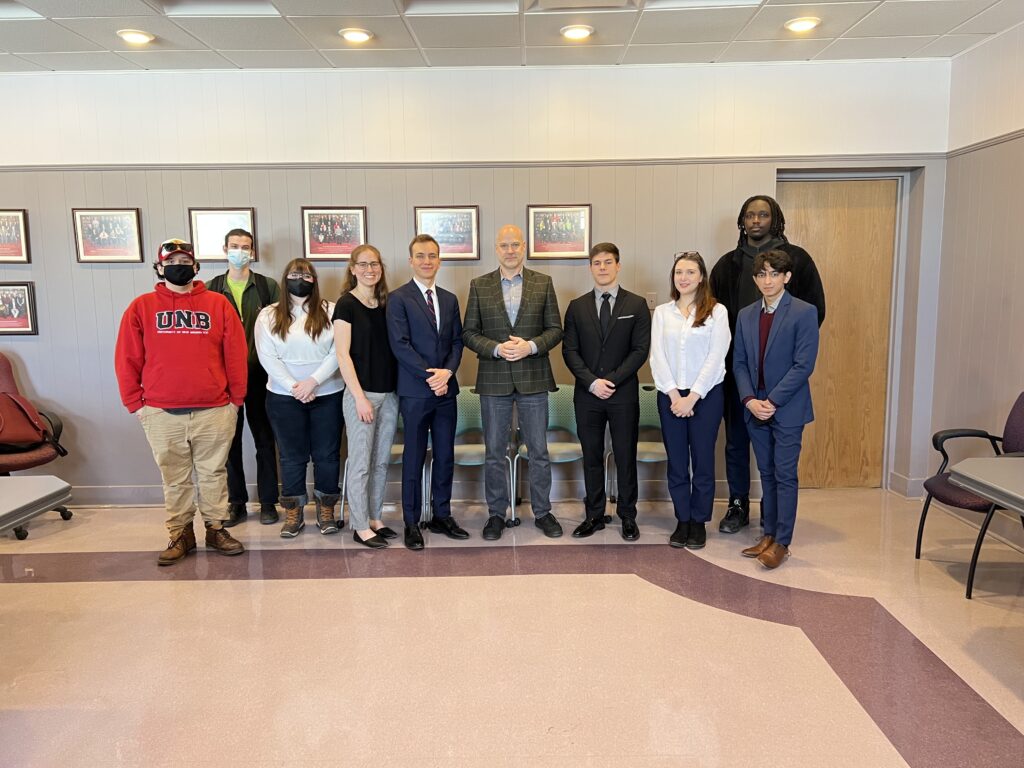David Priess, author of The President’s Book of Secrets and How to Get Rid of a President, recently visited the University of New Brunswick for a lecture on the President’s Daily Brief (PDB).
Priess is an ex-CIA officer who served during the presidencies of Bill Clinton and George W. Bush. He is a Political Scientist and has taught classes at Duke University, the George Washington University, and George Mason University.
The Brunswickan sat with Priess for an interview on April 3rd. Our talk ranged from the nature of real-life intelligence, his book-writing process, current events, and even his dog, the Twitter famous Ollie.
“The purpose of intelligence is to inform a decision maker to help her or him have more information to reduce the uncertainty for a major decision that they have in the government context,” explained Priess, “that usually is in foreign policy.”
“So is Russia going to invade Ukraine or not?” He prompted. “That’s a question that intelligence can help shed some light on.”
He continued: “In order to do that, you need to have information and you need to have analysis.”
“The information is the collection part. And you can imagine different ways you can ask somebody who knows Vladimir Putin,” said Priess.
“If he said anything about invading Ukraine, you can intercept communications between Russian military and political leaders.”
“You can use satellite imagery to see the movement of Russian troops. All of that is information.”
“But you need an analyst who puts all the information together and makes a judgment about what is happening. That is all part of intelligence.”
“In fiction especially like the James Bond movies, they seem to overlook most of that,” he explained.
“And they focus on something which is part of intelligence in some countries, but not others, some treated just as a military function.”
“But in most Western intelligence services, there’s also covert action which is actually changing something overseas,” Priess continued.
“That is not the core purpose of intelligence, simply conceived,” he concluded.
Priess was the first to interview, for a book, all living U.S. Presidents, Vice-Presidents, and their respective CIA directors: “All of them were interesting to talk to or to get information from.”
“I found George H. W. Bush, who was president from 1989 to 1993, the most interesting in some ways.”
“Because he had previously been the head of the CIA before he was vice president and then President,” he explained, “so he had three very different vantage points on intelligence and it was interesting to talk to the person, the one person who had those three roles.”
Priess also highlighted Bill Clinton, with whom he spoke over the telephone: “He also was really sharp, he was remembering a lot of good details.”
“And he gave me some, some color for the book that I didn’t get in other ways.”
A topic that Priess approaches in his book is the adaptation of the President’s Daily Brief to suit the different styles of each president. Priess witnessed these changes first-hand, between the Clinton and Bush administrations.
“Bill Clinton did not take daily in person briefings with an officer who was going to talk with him about it,” he noted.
“He was a reader and he read it, and he did interact with his intelligence briefers on occasion, but not every day.”
Bush had a different approach to intelligence: “When [he] became president, he started right away and said: ‘I want a CIA officer briefing me every day, even when I travel. I want the briefer to go with me.’”
“And that just led to a different dynamic because then it’s not about just the words on the printed page,” he went on.
“It’s about the words on the printed page and the conversation.”
Priess also addressed the current TikTok kerfuffle in the United States: “Oh, it’s not an issue that I’ve studied in depth. People who I take very seriously have raised some real concerns.”
“And the concern isn’t necessarily what TikTok is doing right now with your app.”
“The concern is that the Chinese government can get anything that TikTok picks up when they want to. And that might be okay.”
“People are giving things away to Facebook for free,” said Priess. “But I worry about whether TikTok is picking up other things other than what videos you’re watching, other things on the device.”
“That said, if there were a TikTok ban, there would probably be a similar app with different concerns.”
“I don’t think that TikTok is the end, if TikTok went away tomorrow. It would not be for long, because something like TikTok would become very popular very soon,” Priess concluded.
We asked Priess about his dog, Ollie, who is all over his Twitter feed.
“Ollie is wonderful,” he said, “he is a rescue dog that we found and he found us last year and he is just a big, big, cuddly teddy bear.”
“He is a good boy, and is probably more popular on Twitter than I am,” he joked.
“He also gets to hear me talk about presidents and intelligence a lot, so he is a very good boy. And he’s probably becoming a very well educated boy on politics.”




